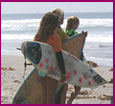
| Tracking the next pandemic: Avian Flu Talk |
Swine Flu symtoms in kids & adults |
Post Reply 
|
| Author | |
Annie 
Valued Member 

Joined: April 06 2009 Location: East Texas Status: Offline Points: 319 |
 Post Options Post Options
 Thanks(0) Thanks(0)
 Quote Quote  Reply Reply
 Topic: Swine Flu symtoms in kids & adults Topic: Swine Flu symtoms in kids & adultsPosted: April 27 2009 at 7:06pm |
|
The Military Health System Blog
Sunday, April 26, 2009 - Swine Flu and You Posted by: LTC Wayne E. Hachey DO, MPH Recently there have been a number of cases of swine flu reported in the media. The Department of Defense and all segments of the U.S. government are working along with our international partners to lessen the impact of swine flu. Swine flu is influenza that occurs in pigs. People do not normally get swine flu but human infections can occur. The most recent cases of swine flu appear to have the ability to be passed from person to person and have resulted in a number of cases in the United States as well as widespread disease in certain parts of Mexico. It is likely that this swine flu will spread to many if not all parts of the United States. When people catch swine flu they may have a fever, cough, sore throat, body aches, headache, chills and fatigue just like the regular flu. Some people may also have vomiting and diarrhea. Previously, swine flus have also caused severe illness and death. As with the regular flu, people with chronic medical conditions are at risk for more severe illness.
Most people catch swine flu the same way they catch the regular flu. You can catch swine flu by coming in contact with droplets from infected people after they sneeze or cough. This can occur by being in the path of a sneeze or cough or touching something that has those droplets on it and then touching your mouth, nose or eyes.
There is a medicine to treat swine flu. Both Tamiflu® and Relenza® are effective against swine flu. You can get these medicines from your doctor. If you have swine flu and need treatment, treatment should start within two days after you begin to feel sick.
However, the best treatment is prevention. There are a number of ways you and your family can reduce the risk of catching swine flu:
· Avoid people with the flu.
· Wash your hands often with soap and water or an alcohol-based hand cleaner.
· Wash your hands before eating or touching your face, after touching surfaces that someone might have coughed or sneezed on, after going out into the community, and after caring for someone who has the flu or touching something that someone who is sick may have touched.
· If someone in your household is sick stay home until that person no longer feels ill.
If you are sick there a number of things you can do to reduce the chances of passing swine flu to others:
· If you are sick stay home from work or school.
· Limit your contact with others.
· Cough and sneeze into disposable tissues. Throw these tissues away into a plastic bag. Limit your exposure to the dirty tissues.
· Those with flu should use separate eating utensils that are washed in hot soapy water after each meal.
· Don’t share objects like remote controls or pens.
· Disinfect surfaces that are frequently touched like door knobs, remote controls, light switches and toilet handles. An effective disinfectant can be made using ¼ cup of household bleach and 1 gallon of cold water.
· If someone in your house is sick you should also stay at home. Don’t go to work or school until they no longer feel sick.
If you think you have swine flu contact your health care provider. He or she will be able to determine if you need testing or treatment. If you experience any of the following warning signs seek emergency medical care right away:
For children:
For adults:
For more information check your local installation hotline or go to www.dod.mil/pandemicflu or www.cdc.gov/swineflu
|
|
|
Dense populations are going to be hit very hard by this pestiferousness little (flu virus) monster. "Technologist"
Stock 3 months water, food, weapon/ammo, meds, supplies, and some money at home. |
|
 |
|
Post Reply 
|
|
|
Tweet
|
| Forum Jump | Forum Permissions  You cannot post new topics in this forum You cannot reply to topics in this forum You cannot delete your posts in this forum You cannot edit your posts in this forum You cannot create polls in this forum You can vote in polls in this forum |